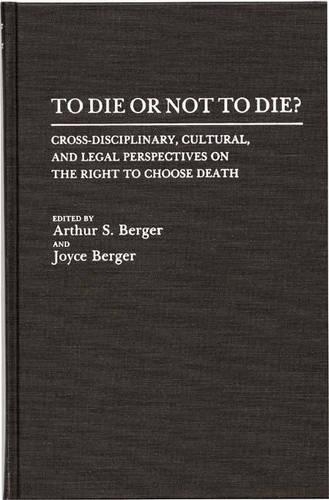
To Die or Not to Die: Cross-Disciplinary, Cultural, and Legal Perspectives on the Right to Choose Death
(Hardback)
Publishing Details
To Die or Not to Die: Cross-Disciplinary, Cultural, and Legal Perspectives on the Right to Choose Death
Bloomsbury Publishing PLC
Praeger Publishers Inc
30th November 1990
United States
Classifications
Tertiary Education
Non Fiction
179.7
Physical Properties
Hardback
208
Width 156mm, Height 235mm
510g
Description
Dramatic advances in medical technology make it possible to keep an individual alive well after life would otherwise be untenable. These medical advances raise complex and disturbing questions about the appropriateness of allowing or even helping a person to die. This book provides guidelines for dealing with the sensitive legal and ethical issues surrounding an individual's right to die. Designed to give a global perspective on these contemporary issues integrates the ideas and experiences of ten authorities from different disciplines, cultures, and legal systems, recognizing that no single discipline offers an insight that is broad enough to solve the problems caused by rapidly changing medical technology. The book discusses the issues in a comprehensive manner integrating the attitudes of various cultures, and investigating the approaches and solutions of several different legal systems. The book is aimed at professionals in medicine, nursing, theology, law, public health and the disciplines of philosophy, ethics, psychology and sociology.
Reviews
A global perspective on advances in medical technology that allow a life to linger which until recently would clearly have been lost. Integrates the ideas and experiences of ten representatives from different disciplines, cultures, and legal systems--acknowledging that no single discipline is broad enough to solve the problems caused by rapidly changing medical technology.-Reference & Research Book News
"A global perspective on advances in medical technology that allow a life to linger which until recently would clearly have been lost. Integrates the ideas and experiences of ten representatives from different disciplines, cultures, and legal systems--acknowledging that no single discipline is broad enough to solve the problems caused by rapidly changing medical technology."-Reference & Research Book News
Author Bio
ARTHUR S. BERGER is Director of the International Institute for the Study of Death and President of the Survival Research Foundation. He was the recipient of two grants for research in experimental thanatology, has written more than 30 papers and four books on thanatology and parapsychology, and has edited and contributed to other books. JOYCE BERGER is Administrator of the International Institute for the Study of Death. She is co-author of the Encyclopedia of Parapsychology and Psychical Research and co-editor of Perspectives on Death and Dying.
